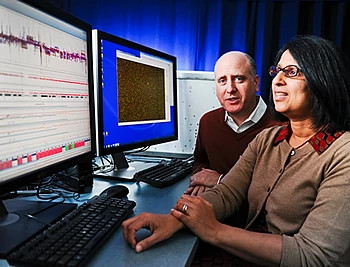Pinpointing a Tumor's Characteristics
The information used in diagnosing a brain tumor takes many forms. At Dana-Farber Brigham Cancer Center, patients' brain tumor tissue undergoes a broad range of diagnostic tests: not only standard pathology exams in which tumor cells are viewed under a microscope, but also next-generation scans for mutated genes and misassembled chromosomes, as well as whole-genome searches for surplus or missing copies of genes.
Such extensive testing helps pinpoint the exact type and characteristics of a particular tumor. The more specific the diagnosis, the more precise the therapy can be.
Tumor tissue from our brain cancer patients undergoes at least four categories of cellular and molecular tests.
- A conventional histopathology test examines the tissue under a microscope for structural abnormalities.
- An immunohistochemistry test focuses on cell proteins, called antigens, that signal a specific type of cancer.
- OncoCopy, a whole-genome scan, is used to detect extra or missing copies of every gene in the genome.
- OncoPanel examines the protein-coding portions of genes to identify mutations associated with cancer. OncoPanel is part of the Profile program, which analyzes tumor tissue for known cancer-related mutations.

Results and Collaboration
The sophisticated testing is enhanced by the expertise of our pathology team in interpreting results and collaborating with physicians to establish accurate diagnoses and treatment plans.
We also leverage test results for future research. Our team can store the tumor tissue and culture it to create a living tissue bank for patients. This tissue can be implanted in mice to create avatars of patients' tumors that are then used to study which treatments are likely to be most effective.